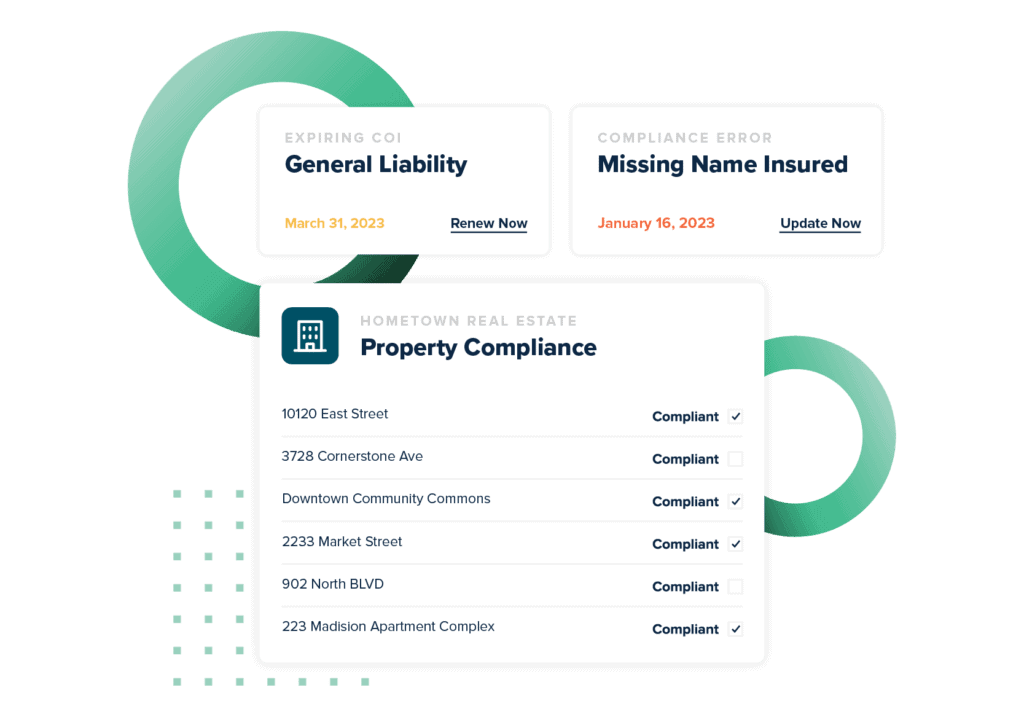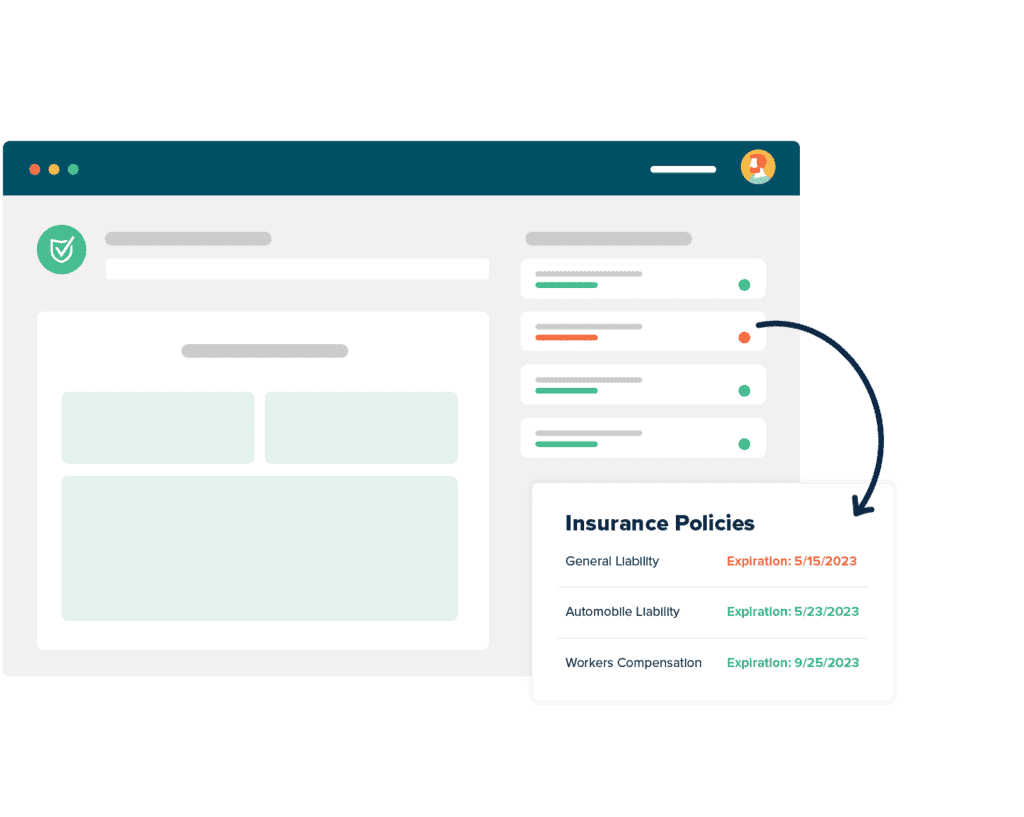Best Certificate of Insurance Tracking Software

Protect Your Business From Costly Claims
Ask your CFO or Risk Manager just how much claims and lawsuits can cost your business. If you are collecting certificates just to confirm they were received, you have no guarantee that your requirements are being met. myCOI Central is built on a foundation of insurance industry logic to ensure you remain protected with the appropriate coverage.
Automate Your COI Tracking
There’s no more need to worry about stacks of certificates cluttering up your office or hours of frustrating phone calls and emails to chase down certificates. myCOI Central provides your company with a solution to automate your insurance certificate requests, collection, and compliance resolution, while also giving your team a single, centralized repository to view compliance.


For Agents & Brokers
Win business and boost retention by providing agency branded, industry leading insurance tracking software to your insureds. Offer software only or add on your own compliance review services.
What Are The Benefits of COI Software?
View all CasesCertificate Of Insurance
The certificate of insurance form (COI) might be one of the most critical items in a company’s risk management portfolio. It’s a simple form, but it carries a lot of weight. If you receive a certificate of insurance for business protection, for example if you hire subcontractors and need those subcontractors to carry the insurance risk they generate through the course of their business, a COI is probably the mechanism by which you confirm that subcontractor is in fact carrying that protection.
Anyone can find a certificate of insurance online. There are easily available PDFs anyone can fill out, and plenty of examples to show them what should go in each box. This small chance for fraud, limited as it may be, is just one of the reasons that companies like myCOI help companies just like yours track and verify the certificates of insurance that you receive.
Whether you’re a certificate holder who receives COIs or a named insured who provides them (we’ll explain those terms below!), knowing the ins and outs of a COI form is key. Let’s take a look.
Certificate Of Insurance Template
You’re a contractor, a subcontractor, or other vendor who does business with other companies. You’re looking at setting up a new client relationship. And at one point, you’re going to hear “great, we just need proof of business insurance for our records.” You’re going to hear that a lot. So it pays to be ready for it.
Proof of business insurance most often means a certificate of insurance, and for new contractors, that can be a new and scary thing. But looking at a certificate of insurance template, like an ACORD 25 example, will help you realize it’s a lot less intimidating than it seems. Plus, the best and safest way to get one is to request it from your insurance broker, not fill it out yourself. Just because you find a certificate of insurance example PDF doesn’t mean you should use it, and when you need an insurance certificate template Word is the worst choice.
What you should focus on, though, is checking that what the certificate says is what the client you’re trying to win requires. Each company, and each state, has their own requirements when it comes to insurance, so you may want to double-check what your broker provides to make sure you’re carrying the coverage required. Look again at that ACORD certificate of insurance sample and make sure you recognize what each box is talking about.
Sample Certificate Of Insurance With Additional Insured
IRMI—the International Risk Management Institute—defines an additional insured as “a person or organization not automatically included as an insured under an insurance policy who is included or added as an insured under the policy at the request of the named insured.” That translates quite often as “I need to extend the coverage I purchase from my insurer to the third-party hiring me to do some work.”
A sample of additional insured endorsements is relatively easy to find online, wherever you look for certificate of insurance templates. A quick search will turn up a plethora of certificate of insurance additional insured samples. What you’re going to see is a standard certificate of insurance, but with the addition of the additional insured. Be careful that you don’t mistake a sample certificate of insurance with additional insured for an example of the kind of coverage you need to secure for your business; that’s a conversation you need to have with your agent or broker, not something you get from a PDF.
If you’re on the other side of this conversation, as a business requesting additional insured status on the certificates of insurance you collect from your third parties, you already know the necessity of such endorsements. Transferring additional risk incurred by your third parties back to those third parties is a critical part of risk management, and few companies can afford to carry the risk of damaging claims on their own books.
Many companies that use a sample letter requesting certificate of insurance from vendors often have special versions of that letter that lay out the requirement for additional insured endorsements. It would include the specific endorsements sought, provide a list of limitations that your company will not accept, or other insurance-related notes like that. Risk management teams often have custom letters for different industries or verticals.
How To Get A Certificate Of Insurance
Answering the question of how to get insurance certificate online depends entirely on who you are and what your role is in this certificate of insurance process, because it affects both sourcing and propriety. We all know that poor tracking on a certificate of insurance costs more than just lost time, but also insurance risk.
Let’s imagine first that you’re a contractor, vendor, or other third-party who is being asked to provide a certificate of insurance before you can begin work. In this case, you want to start with your insurance agent or broker’s website. Many providers offer forms that allow you to request the correct certificate without having to make an appointment or make a phone call.
What you should not do, though, is start wondering how to get ACORD insurance certificates online yourself, so you can fill them out without your agent. Don’t do that. Never do that. Let your insurance agent or broker do that. It’s their job, they’re the experts.
If you’re a certificate holder (the person or entity who receives certificates of insurance) and you need to request updated certificates, you can also start at the insurer’s website, if you know which agent to check out. This can happen in some instances when a certificate holder needs a new or updated certificate because of discrepancies or questions.
Lastly, if you’re an insurer looking for form templates, or even sitting at your computer asking “how do I get a certificate of insurance form template,” check with your senior leadership or check online for resources. ACORD provides helpful instructions for agents and brokers about filling out their forms.
Certificate Of Insurance Sample
If you’re a contractor or a vendor, a certificate of insurance ACORD form is only one of the many types of insurance forms you might be sharing with someone else, though. In general, then, it is helpful to see a certificate of insurance form sample.
At its most basic, this certificate has all the relevant information regarding your insurance policy. There is a lot of information that could be included on this form. For example, this form might have information on when the policy comes into play, its duration, who owns the policy, what the limit on the policy is, and who you need to contact if you need to file a claim.
If you are looking for a sample certificate of insurance with additional insured, though, then you might be looking for a slightly different document. This certificate includes added endorsements in very specific situations. If you need a certificate of insurance with additional insured, you need to reach out to the insurance agent or broker to make sure you have this type of coverage.
If you’re looking for a certificate holder insurance form, well, stop looking. That’s not a thing. A certificate holder is the entity that receives the certificate of insurance from a contractor, vendor, or other provider. If you receive certificates, that’s you. If you provide them to companies that hire you, that’s the company hiring you.
Remember that even an ACORD certificate of insurance sample is just that: a sample. Not an example, and certainly not proof of coverage.
Which Vendors Need A Certificate Of Insurance
If you’re a contractor or business asking which vendors need a certificate of insurance, the answer is pretty simple: any vendor that enters your business premises and takes any actions that may generate any risk at all needs to give you a certificate of insurance. You want each vendor to have a certificate of insurance for delivery to you, in hand, before the work begins.
That sounds pretty vague, we know, but it’s a simple reality. Risk exists all around us, whether we generate it or not, and the last thing you want to do is assume the burden of risk your vendor opened you to because you failed to secure a certificate of insurance.
Now you may ask “what is a certificate of insurance for vendors?” and the answer is, the same thing you provide to other entities that you do work on behalf of. It should show the vendor’s coverage, any limitations or exclusions, and all the usual information.
Knowing how to request a certificate of insurance from a vendor likely comes down to how your business works with vendors. In many cases, COIs with the required coverages are required as part of the vendor application process or were specified in the RFP, or in an agreement or contract. If not, it’s often a requirement before the vendor can begin working.
If you deal with a lot of vendors, you can often save a lot of time by having a sample letter requesting certificates of insurance from vendors on hand.
How To Check Certificate Of Insurance
Certificate of insurance compliance is the work a risk manager or compliance admin does to collect, verify and maintain the certificates of insurance provided to that company by its third parties: they are the experts who know how to check certificate of insurance compliance.
Each certificate of insurance has to be checked, first and foremost to ensure that it claims all the necessary coverages, amounts, limits, and exclusions that your company requires of its contractors. Sure, there is general liability insurance mentioned, but does it protect to the same amount that you require?
Also, what assurances do you have that the contractor didn’t let the policy lapse the day after they handed you the COI? Are you verifying with insurance agents that these contractors still hold the policies and protections that their COI claims? Are there exclusions to the contractor’s protection that will mean you’re held responsible for risk that should properly rest with the contractor?
Remember that there are varied certificates of insurance requirements by state, and you need to be aware of them. Certificate of insurance best practices in every case remind you to check your state requirements, and we’d be remiss if we didn’t do the same.
Certificates Of Insurance For Subcontractors
If you’re a subcontractor, or you hire subcontractors and have to track the certificates of insurance you receive from them, you may see a few oddities. Depending on what state you’re working in, certificates of insurance for subcontractors may sometimes lack evidence of workers’ compensation coverage. This is because several states do not require workers’ compensation coverage for what are called sole proprietorships, where the individual worker is the only employee of their one-person company. If you’re unsure whether or not there should be a workers comp policy by statute, consult with your state’s workers compensation board.
Even in states where it is not legally required, however, many companies that hire subcontractors still require the coverage as a necessity for employment. In that case, a workers’ compensation certificates of insurance for subcontractors will show the minimum necessary coverage required by the hiring entity. This is because many companies like a certificate of insurance moving risk off their books.
What’s fun about these one-person plans is that often they’re what are called ghost policies: they are workers’ compensation plans, but they have exclusions disallowing coverage for the single employee. They allow subcontractors to satisfy the requirement of needing workers’ compensation, but since they are excluded, the coverage only covers a ghost.
Or in reality, no one.
How To Request A Certificate Of Insurance From A Vendor
We’ve mentioned several times about generating prebuilt request certificate of insurance from vendor letters, for example. Having these kinds of documents handy can really save you time having to write the same letter or email over and over again. But they also have significant usefulness as training aids.
Let’s say you’re on the compliance management team, and you hire a new admin. Having a sample letter requesting certificate of insurance from vendors on hand to show them can save you a lot of time explaining the details of what they’ll need to know when they make a request. It sometimes leads to fun questions like “what is a certificate of insurance for vendors?”, and you’ll have to take the time to train on that, but it’s a step in the right direction.
Almost as important as knowing what to put in a letter, though, is knowing how to request a certificate of insurance from a vendor. Each business will have its own process: some places make it part of the application process, and some will handle it as a new vendor task after the vendor has been accepted. Your own business will have its own process.
Certificate Of Insurance Online
Answering the question of how to get certificates of insurance online depends entirely on who you are and what your role is in the certificate of insurance process, because it affects both sourcing and propriety. Small business insurance is quite different from professional services insurance, for instance, and you need to know the difference before you start asking how to get a certificate of insurance for an event.
First, let’s imagine that you’re a contractor, vendor, or other third-party who is being asked to provide a certificate of insurance before you can begin work. In this case, you want to start with your insurance agent or broker’s website. Many providers offer forms that allow you to request the correct certificate without having to make an appointment or make a phone call.
What you should not do, though, is start wondering how to get insurance certificate online yourself, so you can fill them out without your agent. Don’t do that. Never do that. Let your insurance agent or broker do that. It’s their job, they’re the experts.
If you’re a certificate holder (the person or entity who receives certificates of insurance) and you need to request updated certificates, you can also start at the agent/agency’s website, if you know which agent to check out. This can happen in some instances when a certificate holder needs a new or updated certificate because of discrepancies or questions.
Lastly, if you’re an insurer looking for form templates, or even sitting at your computer asking “how do I fill out an ACORD certificate of insurance,” check with your senior leadership or check online for resources. ACORD provides helpful instructions for agents and brokers about filling out their forms.
Certificate of Insurance (COI)
The concept of a certificate of insurance (COI) is not a new one. In a very basic form, you probably have a certificate of your auto insurance in your car or your wallet. The form is a bit more complex for business general liability insurance, but the concept is the same: a document issued by an agent or broker saying that the bearer is insured against certain actions to certain levels of protection.
Most agents or brokers will give you a certificate automatically, or offer you a way to request your certificate of insurance online via their website.
Now that we’ve talked about how important certificates of insurance are, let’s look at an example of what one looks like. By far the most common general liability form is the ACORD 25 general liability insurance form, but you should check a certificate of insurance PDF from whatever source your company uses.
All of the fields are clearly labeled, and your agent or broker should provide it to you already filled out, but let’s look at the high points. The Insured box should have your name or your company’s name in it since it’s certifying your insurance. Depending on your coverage, you may see values in the General Liability box, the Automobile Liability box, or the Umbrella/Excess Liability box, and so on.
Certificate Of Insurance For Business
When it comes to needing a certificate of insurance for business purposes, much depends on which business you are in that relationship. Let’s first look at when you’re the requesting business: you’re hiring contractors or vendors and you need to ensure they’re carrying the requisite coverage to shield your company from risk they create, without exclusions or limitations that your business won’t accept.
It almost goes without saying that you’re also on the lookout for fake business insurance certificates or other attempts at fraud.
In this instance, you probably have either a tool like myCOI to help you with this, or you have a risk management checklist of some sort to check the certificates of insurance against. One common check is to decide whether your company needs to be just the insurance certificate holder vs additional insured; being endorsed as additional insured can extend coverage to your organization in the event of a loss or litigation caused by the third party you hire.
And if you’re on the other side, the contractor or vendor providing the certificate of insurance, all you really need to do is consult with your broker or other insurer, ensure you meet and can accept all the coverage requirements requested, and get an acceptable certificate of insurance issued by your broker.
How To Request A Certificate Of Insurance From A Vendor
If you’re a contractor or business asking “when do you need a certificate of insurance from a vendor?,” the answer is pretty simple: before any vendor that enters your business premises or project site to perform work and takes any actions that may generate any risk at all needs to give you a certificate of insurance. Your company’s minimum insurance requirements for vendors will likely give you some guidance.
That sounds pretty vague, we know, but it’s a simple reality. Risk exists all around us, whether we generate it or not, and the last thing you want to do is assume the burden of risk your vendor opened you to because you failed to secure a certificate of insurance.
Now you may ask “what is a certificate of insurance for vendors?” and the answer is, the same thing you provide to other entities that you do work on behalf of. It should show the vendor’s coverage, any limitations or exclusions, and all the usual information. You should request certificates of insurance from vendors every time you hire them.
Knowing how to request a certificate of insurance from a vendor likely comes down to how your business works with vendors. In many cases, COIs with the minimum insurance requirements for vendors are required as part of the vendor application process or were specified in the RFP, or in an agreement or contract. If not, it’s often a requirement before the vendor can begin working.
If you deal with a lot of vendors, you can often save a lot of time by having a sample letter requesting certificate of insurance from vendors on hand. Knowing how to request a certificate of insurance from a vendor does little to shield you from the hours of work you have ahead of you verifying all those resultant COIs, though.
ACORD Certificate Of Insurance Sample
As you are looking at your ACORD certificate of insurance form sample, and then double-checking your own actual certificate, it is important to make sure there are no mistakes. If you’re providing this certificate to a hiring entity, they’re going to verify your coverage. If there are discrepancies, that could slow down when you begin work or even delay the project.
Think of it this way: in many states, you’re required to carry a certificate of car insurance sample—well, not a sample, the little card your car insurance agent gives you is the actual certificate—in case you get pulled over, to prove you’re covered in case of an accident. Companies have to do the same check, except the insurance requirements for businesses when dealing with other businesses are far more complex.
If you’re learning how to read certificates of insurance, an ACORD certificate of insurance sample is a good place to start. It is the most common general liability certificate of insurance form. Knowing how to ACORD insurance certificates is as easy as knowing how to use Google.
On the sample ACORD 25, there are a few common mistakes people make. One of the most common mistakes is getting policy numbers confused. Your auto, workers’ compensation, and general liability insurance policies may have different policy numbers. Make sure you pair the right policy number with the right type of insurance.
Furthermore, these policies may have different expiration dates. Do not assume they all have the same effective date and expiration date. If you do, you may end up assigning the wrong dates to the wrong policies. This will render your ACORD 25 form inaccurate. Double-check the policy effective dates and expiration dates before you provide the certificate to anyone. If you have questions about your insurance policies, reach out to your insurance provider for more information.
Finally, be sure you know which form you need to be looking at. The general liability insurance form is quite different from an ACORD certificate of property insurance form.
Certificates Of Insurance Best Practices
At myCOI we erase the worry businesses have about noncompliant certificates of insurance (COIs) because we know our industry-leading technology and unmatched professional insurance staff make us the best choice for any company dealing with hundreds or thousands of certificates. We know, from experience helping hundreds of companies succeed, what certificates of insurance best practices are.
There’s a wide breadth of familiarity with certificates of insurance. New subcontractors, for instance, might be asking us “where do I get a certificate of insurance”, moments before we heard “when do you need a certificate of insurance from a vendor?” from brand-new risk managers or compliance admins.
The answers, by the way, are from your agent or broker, and before the vendor starts any work.
There’s a lot of complexity in certificate of insurance tracking and management. Knowing where to find certificates online, knowing how to request a certificate of insurance from a vendor, these are just the starting points. You also need to know your company’s requirements around insurance coverage, so you can confirm that the COIs you receive actually claim the coverage you need to see to let the vendor begin work. You need to know what each box of the certificate of insurance form is for, and what the numbers mean. You need to know the difference between a certificate holder and an additional insured, and perhaps dozens more differences depending on your company’s requirements as well as the state and local insurance requirements.
It’s a complicated job, and every COI you accept that is noncompliant can open your business to the potential for significant risk. You don’t want to have to explain why your company is liable for a claim that should rightfully lay with the vendor. Trust us. We hear these horror stories all too often.
Certificates Of Insurance Issues And Answers
We know this can be a complicated topic because we get asked about certificate of insurance issues and answers all the time. Insurance is a complicated field with nuances around every corner, and almost every situation has some kind of unique aspect. Understanding coverage, understanding what the certificates of insurance actually say—and what they don’t say—can be, and often is, a full-time job, and it often takes more than glancing at a certificate of insurance template.
There are two parties you want to check within almost any instance of questions around certificates of insurance. First, for questions like which vendors need a certificate of insurance, check with your company’s risk management department, or when that doesn’t exist, your company’s general counsel about what your vendor insurance requirements are. In many cases, these departments or people can give you a certificate of insurance review checklist to help you ensure that the COIs you review have all the necessary coverage.
The other party will be the agent or broker who issued the certificate of insurance. When you have questions about the coverage, exclusions, or limitations shown on a certificate of insurance you receive, the only safe source of information is the agent or broker itself. Don’t ask the third party who provided you with the certificate; not only does this give them the opportunity to be dishonest, it also sets you up to be taken advantage of out of ignorance or a mistaken belief about coverage. Go to the source. Ask the agent or broker. Certificate of insurance compliance is complicated enough without adding more chances for mistakes.









